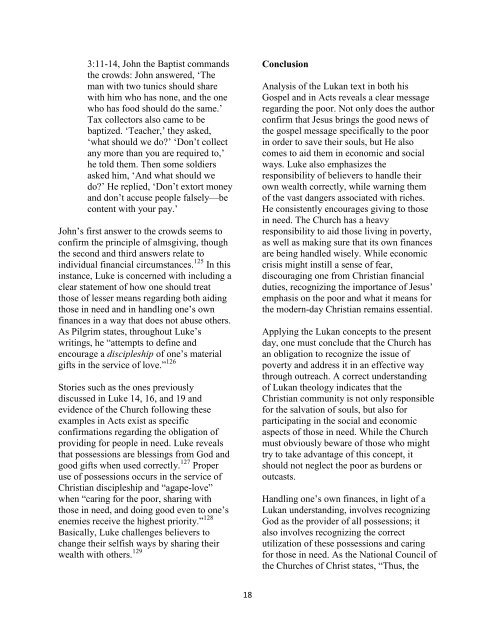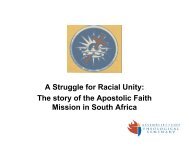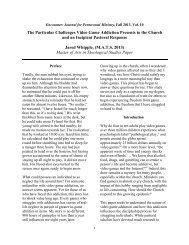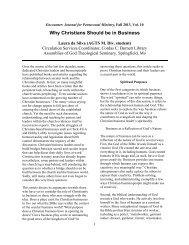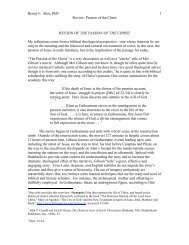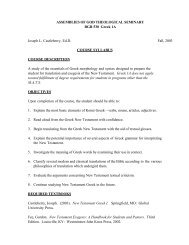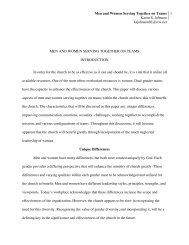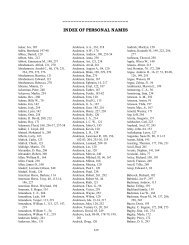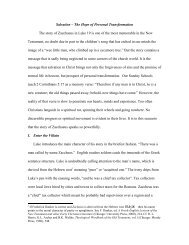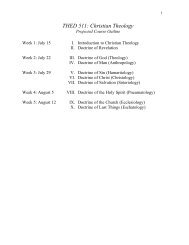Encounter: Journal for Pentecostal Ministry - Assemblies of God ...
Encounter: Journal for Pentecostal Ministry - Assemblies of God ...
Encounter: Journal for Pentecostal Ministry - Assemblies of God ...
You also want an ePaper? Increase the reach of your titles
YUMPU automatically turns print PDFs into web optimized ePapers that Google loves.
3:11-14, John the Baptist commands<br />
the crowds: John answered, „The<br />
man with two tunics should share<br />
with him who has none, and the one<br />
who has food should do the same.‟<br />
Tax collectors also came to be<br />
baptized. „Teacher,‟ they asked,<br />
„what should we do?‟ „Don‟t collect<br />
any more than you are required to,‟<br />
he told them. Then some soldiers<br />
asked him, „And what should we<br />
do?‟ He replied, „Don‟t extort money<br />
and don‟t accuse people falsely—be<br />
content with your pay.‟<br />
John‟s first answer to the crowds seems to<br />
confirm the principle <strong>of</strong> almsgiving, though<br />
the second and third answers relate to<br />
individual financial circumstances. 125 In this<br />
instance, Luke is concerned with including a<br />
clear statement <strong>of</strong> how one should treat<br />
those <strong>of</strong> lesser means regarding both aiding<br />
those in need and in handling one‟s own<br />
finances in a way that does not abuse others.<br />
As Pilgrim states, throughout Luke‟s<br />
writings, he “attempts to define and<br />
encourage a discipleship <strong>of</strong> one‟s material<br />
gifts in the service <strong>of</strong> love.” 126<br />
Stories such as the ones previously<br />
discussed in Luke 14, 16, and 19 and<br />
evidence <strong>of</strong> the Church following these<br />
examples in Acts exist as specific<br />
confirmations regarding the obligation <strong>of</strong><br />
providing <strong>for</strong> people in need. Luke reveals<br />
that possessions are blessings from <strong>God</strong> and<br />
good gifts when used correctly. 127 Proper<br />
use <strong>of</strong> possessions occurs in the service <strong>of</strong><br />
Christian discipleship and “agape-love”<br />
when “caring <strong>for</strong> the poor, sharing with<br />
those in need, and doing good even to one‟s<br />
enemies receive the highest priority.” 128<br />
Basically, Luke challenges believers to<br />
change their selfish ways by sharing their<br />
wealth with others. 129<br />
18<br />
Conclusion<br />
Analysis <strong>of</strong> the Lukan text in both his<br />
Gospel and in Acts reveals a clear message<br />
regarding the poor. Not only does the author<br />
confirm that Jesus brings the good news <strong>of</strong><br />
the gospel message specifically to the poor<br />
in order to save their souls, but He also<br />
comes to aid them in economic and social<br />
ways. Luke also emphasizes the<br />
responsibility <strong>of</strong> believers to handle their<br />
own wealth correctly, while warning them<br />
<strong>of</strong> the vast dangers associated with riches.<br />
He consistently encourages giving to those<br />
in need. The Church has a heavy<br />
responsibility to aid those living in poverty,<br />
as well as making sure that its own finances<br />
are being handled wisely. While economic<br />
crisis might instill a sense <strong>of</strong> fear,<br />
discouraging one from Christian financial<br />
duties, recognizing the importance <strong>of</strong> Jesus‟<br />
emphasis on the poor and what it means <strong>for</strong><br />
the modern-day Christian remains essential.<br />
Applying the Lukan concepts to the present<br />
day, one must conclude that the Church has<br />
an obligation to recognize the issue <strong>of</strong><br />
poverty and address it in an effective way<br />
through outreach. A correct understanding<br />
<strong>of</strong> Lukan theology indicates that the<br />
Christian community is not only responsible<br />
<strong>for</strong> the salvation <strong>of</strong> souls, but also <strong>for</strong><br />
participating in the social and economic<br />
aspects <strong>of</strong> those in need. While the Church<br />
must obviously beware <strong>of</strong> those who might<br />
try to take advantage <strong>of</strong> this concept, it<br />
should not neglect the poor as burdens or<br />
outcasts.<br />
Handling one‟s own finances, in light <strong>of</strong> a<br />
Lukan understanding, involves recognizing<br />
<strong>God</strong> as the provider <strong>of</strong> all possessions; it<br />
also involves recognizing the correct<br />
utilization <strong>of</strong> these possessions and caring<br />
<strong>for</strong> those in need. As the National Council <strong>of</strong><br />
the Churches <strong>of</strong> Christ states, “Thus, the


